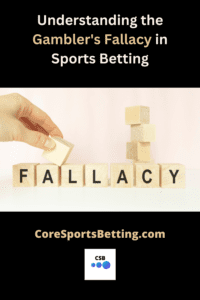If you've been exploring the world of sports betting, you’ve probably come across the term "parlay."…
Understanding the Gambler’s Fallacy in Sports Betting

Success in sports betting depends not only on knowledge and strategy but also on psychological insight. The gambler’s fallacy in sports betting is a frequent misconception that can mislead even the most experienced bettors. Understanding and avoiding this fallacy is extremely important for making informed decisions and maintaining a healthy bankroll.
What Is the Gambler’s Fallacy?
The gambler’s fallacy in sports betting and really in any form of betting is the erroneous belief that the outcome of a random event is influenced by previous outcomes. In other words, it’s the assumption that if something happens more frequently than normal during a given period, it will happen less frequently in the future, or vice versa. This misconception leads individuals to expect a “balancing out” of random events, despite each event being independent.
For me, my first encounter (that I can remember) with the gambler’s fallacy happened when I was much younger. I was at a local casino playing roulette. I was fixed upon betting either red or black, basing my decisions on whichever color had hit last. Unsurprisingly, this strategy didn’t pan out and only lasted three spins. I placed $25 on red (or at least, I think it was red—this was a long time ago). It lost. Undeterred, I doubled my bet to $50, adopting a martingale approach, and lost again. Determined to recoup my losses, I doubled it once more to $100—another loss. I still vividly remember the lady at the table giving me a sympathetic smile and softly saying, “Sorry.” I smiled back, shrugged it off, and walked away.
Sports Example: Basketball Free Throws
Here’s another example of the gambler’s fallacy, this time in the context of sports betting.
Consider a basketball player who has missed five consecutive free throws. A person succumbing to the gambler’s fallacy might believe that the player is “due” to make the next shot, assuming that a successful free throw is more likely after a series of misses. However, each free throw is an independent event, and the probability of making or missing a shot remains consistent, unaffected by previous attempts.
Why Is It Important to Avoid the Gambler’s Fallacy?
Falling prey to the gambler’s fallacy can have several negative effects on sports betting. It can lead to misguided wagers, unnecessary risks, and a reliance on faulty reasoning rather than sound strategy. Over time, these patterns can undermine both confidence and profitability, making it harder to achieve consistent success. By recognizing and addressing this bias, bettors can stay focused on logical, well-informed decisions. Below are just some of the ways it can play a role.
Poor Decision-Making: Bettors may place wagers based on incorrect assumptions about the likelihood of outcomes, leading to misguided bets.
Bankroll Mismanagement: Believing that a win is “due” can prompt bettors to increase their stakes irrationally, risking more than their bankroll can sustain.
Emotional Betting: The fallacy can lead to emotional decisions rather than logical analysis, undermining a bettor’s overall strategy.
Ignoring Relevant Data: Focusing on perceived patterns may cause bettors to overlook critical factors such as team performance, player injuries, or other pertinent statistics.
How to Avoid the Gambler’s Fallacy
Recognize Independence of Events: Understand that in sports, many events are independent. For example, a coin toss has no memory; each flip is a separate event with equal probability. Similarly, a team’s previous wins or losses don’t directly influence future game outcomes without considering other variables.
Base Decisions on Data and Analysis: Focus on relevant statistics, player performances, team dynamics, and other concrete information rather than perceived patterns or streaks.
Maintain Emotional Discipline: Avoid letting recent outcomes sway your judgment. Stick to a well-thought-out betting strategy and resist the urge to chase losses or bet impulsively based on the fallacy.
Effective Bankroll Management
Proper bankroll management is essential in sports betting to mitigate risks and sustain long-term participation. Here are some strategies to consider:
Set a Budget: Determine the amount of money you’re willing to allocate for betting, and never exceed this limit.
Use Unit Betting: Bet a fixed percentage of your bankroll (e.g., 1-2%) on each wager to manage risk effectively.
Avoid Chasing Losses: Don’t increase your bets to recoup losses, as this can lead to further financial trouble.
Keep Records: Maintain detailed records of your bets, including amounts wagered, types of bets, and outcomes, to analyze performance and adjust strategies accordingly.
Stay Informed: Continuously educate yourself about the sports you’re betting on, as well as betting strategies and market conditions.
Conclusion
Avoiding the gambler’s fallacy in sports betting is vital for making rational decisions and protecting your bankroll. By recognizing the independence of events, relying on data-driven analysis, maintaining emotional discipline, and implementing effective bankroll management strategies, you can enhance your betting experience and increase your chances of long-term success.
Like this article? Pin it on Pinterest!





